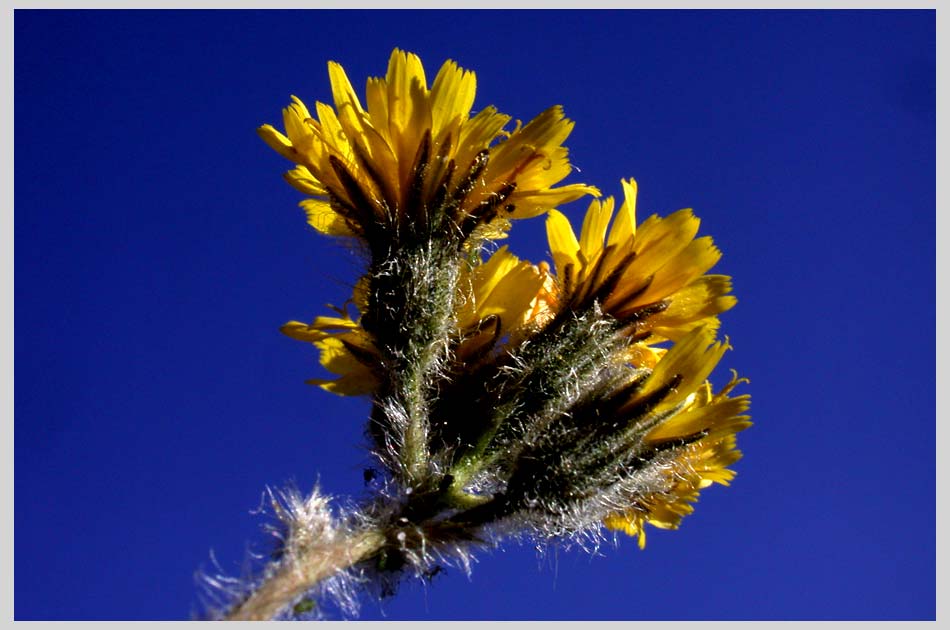

Western Hawkweed, skyview at 2200 m. [ click photo for next . . . ]
(Hieracium albertinum)


Western Hawkweed, skyview at 2200 m. [ click photo for next . . . ]
(Hieracium albertinum)
Member of the Aster family, Hawkweed is a perennial
which is densely pubescent with long white hairs and a milky
sap found in the entire plant. According to plant ecologist,
Charles Johnson, Hawkweed was used as a source of chewing gum
by Native Americans.
Eagle Cap Wilderness . . .
FOUR MINIATURES ON FORM
(1) A melody, or a phrase in a poem, is not built up of parts like a wall
is built up of bricks. Fold into fold, the parts reflect and refer to the
whole, while the whole in turn gives structure and order to the parts.
It is the quality of the movement of the whole that is primary. Vitally
important is that this movement can only partially be seen or studied
on the printed score or page.
(2) Form—whether that of a musical composition, or a poem, a ribbon
of water, or of a flower—emerges out of movement; it is the outward
envelope of the rhythmic pulse of change.
(3) Complicatedness is difficulty which serves no purpose and is there-
fore without reason or meaning; it is difficulty which is unnecessary.
Nothing else defeats the mind more quickly than having to deal, on a
day-to-day basis, with unnecessary difficulty which goes unresolved.
In any traditionally hierarchical social structure, whether it be a school,
an army, a symphonic orchestra, or large corporation, this is the single
most important factor which frustrates the intelligence, or creativity of
the individual.
Remarkably, in this sense, complicatedness in Nature does not exist.
This is because it wastes energy, and therefore contradicts Nature’s
economy of the watercourse way.
(4) Intelligence flows like water around all
unnecessary difficulty. Poor design imposes
arbitrary blocks or limits to the freedom
of this flow.
TWO MINIATURES ON RELATIONSHIP
(1) Some people make us smart; others, make us stupid. Some people
make us happy; others, make us sad. If dialogue and compassion form
two sides of the triangle of friendship, then encouragement, or the
mutual generation of the creative energy that makes real change and
discovery possible, might be the third.
This is how the world becomes a
better place, two people at a time.
(2) Have you ever thought about why the world of Nature no longer
informs or shapes our manner of movement or dress? Or why, in a more
general way, contemporary culture no longer seems shaped or informed
by a fertile interaction of human creativity and place? Is this not in part
because of a kind of not physical, but rather spiritual, colonization?
In the past, the colonization of the mind practiced by organized impe-
rial religions wanted us to believe this or that primarily as a means of
spiritual dominion and control (The actual details of content are in my
view irrelevant.). Now, the instruments of commerce, corporations,
governments, and, yes, once again—religion—all wish in similar ways
to take possession of our souls. They do this by conditioning our likes
and dislikes. Consider that by the time the average student arrives at
a North American university, he or she will have seen a solid 12,000
hours of commercial television. Extraordinary, by any standard.
These new instruments of control thereby gain great influence over
how we vote, how we spend our money, and how and what we believe
is true and important. And this they have done with amazing success.
If you think this exaggeration, imagine this tableau: put a young
person from China, India, Japan, Australia, North or South America,
or Europe on a forest path anywhere in the world. Remarkably, they
will in a nearly identical way look wholly out-of-place. Their move-
ments will all seem to emerge from one simple, common, programmed
language. These movements say, “Hey, dude! I speak MTV! Get out of
the way.”
A revolt of youth? Quite doubtful. Personally, I wish it were.
But that would require I think at the very outset the inspired auster-
ity of doing without, of throwing away the keys to the car, tearing up
every logo in sight, swearing off trash food forever, and smashing your
CD’s and lining up for execution in the backyard your TV. Perhaps the
most endangered species of the Western world has become the free
spirit, the young or old person—age makes no difference here—who
can think, see and act with intellectual integrity and independence.
I say to you, to outfit oneself in style for the coming peaceful, inward
revolution, one need not buy a single thing.
Now imagine that!
DOUBLE BIND
Our troubled relationship with the Earth?
God wrote the music.
The Devil conducts.
And don’t forget:
Everyone must play in the Symphony of Life.
The contract says, “forever.”
So we push our buttons, hit our drums,
and stroke our strings,
all at his command.
Remember: Everyone must play.
The contract says, “forever.”
He reminds us, “Poor child. There’s no
way in Hell you could live without the results.”
And we believe him.
Camp Lost & Found,
Eagle Cap Wilderness,
Oregon, IX.15.2008
THE LITTLE CLAVIER please preview 150
of 631 pages w/ my black & white
photography [opens in new window]
NEW: To view / purchase high quality prints & matted frames
at the Photoweek Northwest online store, SLIDESHOW
http://picturepoems.zenfolio.com/
All Photographs & texts by Cliff Crego © 2012 picture-poems.com
(created: X.11.2008)